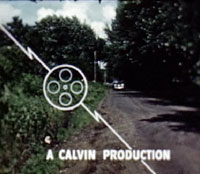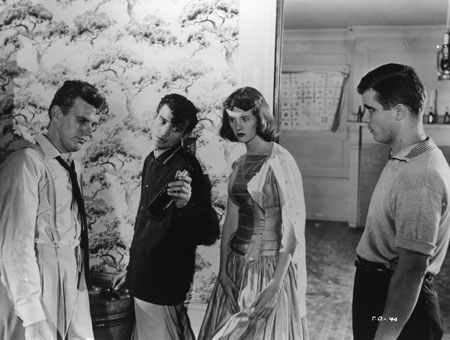
Robert Altman returned to his hometown of Kansas City in the late 1940s. There, without any real filmmaking experience, he managed to land a job in the service department of the Calvin Company. The Calvin Company produced industrial films, typically around twenty minutes in length, running the gamut from educational films to straightforward pitches to “sponsored films,” which nominally addressed a given topic while providing the film’s sponsor a chance to spotlight its products. Altman soon moved into Calvin’s production division, becoming one of the half-dozen writer/director/editors that Calvin kept on staff.
While the Calvin Company’s full output, as well as Altman’s contributions, have yet to be thoroughly accounted for, the WCFTR and Wisconsin Historical Society’s holdings do provide some significant documentation of Altman’s years at the firm.
Honeymoon for Harriet
Honeymoon for Harriet, made in 1948, most likely holds the distinction of being Altman’s first completed film. Following a retiring mailman and his young replacement along country roads, the film features the veteran training his apprentice while telling the story of newlyweds whose honeymoon was constantly delayed because an International Harvester dealership was located on the way to the travel agency. In an interview with film critic David Thompson, Altman claimed that Calvin allowed him to direct the film, which he also wrote, because no one else could figure out how to record the soundtrack of the open road conversation. In fact, Altman created his own technique for satisfactorily looping dialogue, something Hollywood had mastered years earlier. (From the International Harvester Film Collection, WHS.)
The Perfect Crime
This Calvin film was sponsored by the Caterpillar Corporation, makers of heavy construction machinery, and in its own roundabout and highly dramatic way presents an argument for highway construction. Altman wrote the holdup of a mom-and-pop convenience store into the script and used the film as an opportunity to hone his skills for staging action. The director experimented with rapid editing and perceptual subjectivity, including a shot from Pop’s point-of-view, as Mom and a little girl get shot. (From the Patrick McGilligan Collection, WCFTR.) The experimentation on display in these two sponsored films signals Altman’s approach to filmmaking at the Calvin Company. In an interview with Patrick McGilligan, Calvin’s head of production, Frank Barhydt, describes Altman’s methods (audio will open in new window).
During his time in Kansas City, Altman also initiated and participated in several independent productions, several of which are also documented in the WCFTR’s holdings. They include Corn’s-a-Poppin’ (1954), The Model’s Handbook (ca. 1956), and The Delinquents (1957).
Corn’s-a-Poppin’
Altman co-wrote the screenplay to this 1954 musical about a variety show sponsored by Pinwhistle Popcorn. Mr. Pinwhistle’s newly hired public relations man sabotages the show by convincing his boss to use a new, lower quality, brand of popcorn and new, lower quality, performers, all in an attempt to lower the company’s asking price so that Pinwhistle’s predatory competitor can purchase the company for peanuts. The plan backfires and the show’s announcer, played by Jerry Wallace, is discovered to be a true musical talent. Altman’s coworker at Calvin, Bob Woodburn, directed the film, and it is unclear exactly what Altman contributed to the screenplay. While the film’s entertainment value lies almost entirely in the domain of camp, it has proven tantalizing for programmers of Altman retrospectives and those critics and scholars looking for traces of Altman’s authorial fingerprints.
The Model’s Handbook
Along with A Perfect Murder, Patrick McGilligan’s research into Altman’s early work also turned up a print of a promotional film Altman made independently for the Ford Modeling Agency. Altman intended the film to serve as the first installment in a weekly television series, but it proved to be a difficult sell. The Model’s Handbook provides a contrived, behind-the-scenes look at the Ford Agency (where agency heads Eileen and Gerald seem to spend all their time answering phones), in addition to practical instruction for aspiring models. The bulk of the film depicts top Ford model Dorian Leigh as she demonstrates proper exercise technique on a carpet square in front of a line drawing of a gymnasium. Altman transitions from exercise to exercise through the use of wipes, and he carefully matches Leigh’s position and movement as he cuts from the model in her street clothes at the agency to the footage of Leigh exercising in her leotard.
The Delinquents
 A publicity still from The Delinquents, which caught the attention of Alfred Hitchcock and helped launch Altman’s television career.
A publicity still from The Delinquents, which caught the attention of Alfred Hitchcock and helped launch Altman’s television career.
Altman made his own break when he wrote and directed this low budget independent entry in the 1950s juvenile delinquent cycle. In his biography of Altman, McGilligan writes that Alfred Hitchcock himself was reportedly “enamored” of the film and instructed the producer of Alfred Hitchcock Presents, Joan Harrison, to give Altman a directing slot. The WCFTR’s Photos and Promotional Material collection contains lobby cards and stills from the film that hint at what Hitchcock saw in Altman’s work. The Patrick McGilligan collection also contains interviews with the film’s cameraman, Charley Paddock, and camera operator and future editor, Lou Lombardo. Both men worked with Altman at Calvin.
Those interested in seeing more films produced by Calvin, including The Magic Bond, a film Altman directed for the Veterans of Foreign Wars, should consult the moving images collection at the Internet Archive, a website dedicated to providing free access to so-called “ephemeral” films like the industrials made by Calvin and its competitors.
Related Links
